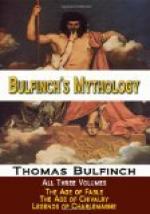The embassy went after Matholch, and told him all these sayings in a friendly manner; and he listened thereunto. “Men,” said he, “I will take counsel.” So to the council he went. And in the council they considered that, if they should refuse this, they were likely to have more shame rather than to obtain so great an atonement. They resolved, therefore, to accept it, and they returned to the court in peace.
Then the pavilions and the tents were set in order, after the fashion of a hall; and they went to meat, and as they had sat at the beginning of the feast so sat they there. And Matholch and Bendigeid Vran began to discourse; and, behold, it seemed to Bendigeid Vran, while they talked, that Matholch was not so cheerful as he had been before. And he thought that the chieftain might be sad because of the smallness of the atonement which he had for the wrong that had been done him. “O man,” said Bendigeid Vran, “thou dost not discourse to-night so cheerfully as thou wast wont. And if it be because of the smallness of the atonement, thou shalt add thereunto whatsoever thou mayest choose, and to-morrow I will pay thee for the horses.” “Lord,” said he, “Heaven reward thee!” “And I will enhance the atonement,” said Bendigeid Vran, “for I will give unto thee a caldron, the property of which is, that if one of thy men be slain to-day, and be cast therein, to-morrow he will be as well as ever he was at the best, except that he will not regain his speech.” And thereupon he gave him great thanks, and very joyful was he for that cause.
That night they continued to discourse as much as they would, and had minstrelsy and carousing; and when it was more pleasant to them to sleep than to sit longer, they went to rest. And thus was the banquet carried on with joyousness; and when it was finished, Matholch journeyed towards Ireland, and Branwen with him; and they went from Aber Menei with thirteen ships, and came to Ireland. And in Ireland was there great joy because of their coming. And not one great man nor noble lady visited Branwen unto whom she gave not either a clasp or a ring, or a royal jewel to keep, such as it was honorable to be seen departing with. And in these things she spent that year in much renown, and she passed her time pleasantly, enjoying honor and friendship. And in due time a son was born unto her, and the name that they gave him was Gwern, the son of Matholch, and they put the boy out to be nursed in a place where were the best men of Ireland.
And, behold, in the second year a tumult arose in Ireland, on account of the insult which Matholch had received in Wales, and the payment made him for his horses. And his foster-brothers, and such as were nearest to him, blamed him openly for that matter. And he might have no peace by reason of the tumult, until they should revenge upon him this disgrace. And the vengeance which they took was to drive away Branwen from the same chamber with him, and to make her cook for the court; and they caused the butcher, after he had cut up the meat, to come to her and give her every day a blow on the ear; and such they made her punishment.




